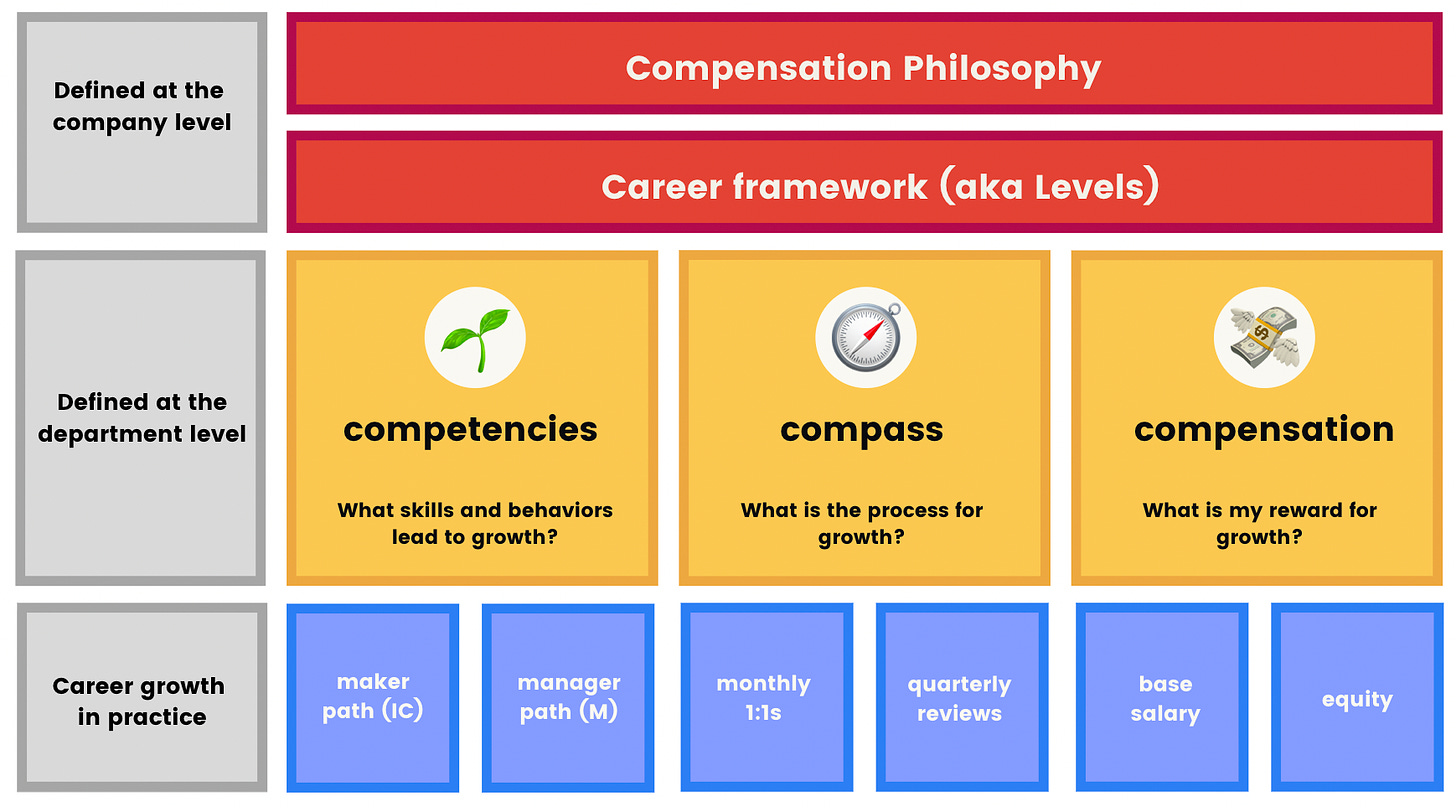001: 🎙What happened when Ethena started including salary range in their job descriptions
An interview with Melanie Naranjo, VP of People at Ethena.
All Damn Good Job posts are free for the first 14 days. Consider subscribing to get these posts straight to your inbox and to support bringing attention to essential topics such as pay transparency and better workplaces.
When I started thinking about this newsletter, Melanie Naranjo from Ethena was the first person on my list of people I wanted to talk with. I admire Ethena’s thoughtful approach to both pay transparency and how they intentionally encourage growth among their team members by baking it into their approach to compensation.
Below, there are a few ways you can learn more about Ethena’s approach to pay:
🎥 You can head straight to the source and watch or listen to our ~25-minute conversation.
📖 I’ve also written out a recap of how Ethena approaches pay transparency and highlighted my favorite parts of our conversation.
If you are reading this, I know you care and think a lot about pay transparency. Thank you for being here with me.
Now, scroll on down to the good stuff! 👇
Ethena’s approach to compensation
In our interview, Melanie and I don’t dive into the weeds of how Ethena structures compensation, we focus more on the why and the competitive advantage it has given them.
But the work they are doing here is really cool so as a bonus to readers, let’s start here using my Pay Transparency framework:
Compensation Philosophy
The copy in italics below is pulled directly from their blog post: A Public and Transparent Formula for Engineering Salaries @ Ethena. They don’t explicitly refer to it as a Compensation Philosophy but it serves the purpose of explaining why they have structured their Career Framework and performance cycles the way that they have:
An essential part of running a healthy organization is ensuring clarity of roles and expectations. Keep things simple and avoid complicated rubrics. Focus on impact. Empower different members of the team to bring impact in different ways.
Promotions: Ethena expects team members to demonstrate a consistent ability to perform at their soon-to-be promoted level for at least 3 months, after which they are promoted at the next review cycle or during a qualifying event (e.g. manager position opens up, etc). There are no limitations regarding how often or quickly someone can be promoted at Ethena.
Career Framework
Ethena has 5 org-wide Levels for each department. They’ve publicly shared what this looks like for their engineering team:
You can see that within the 5 Levels, they also break out smaller milestones of growth from I to II for certain roles.
Competencies
Every job level has expectations bucketed under:
scope of role
hard skills
soft skills
leadership skills
In addition to these competencies, they’ve added a sample problem someone in a specific role might experience and how they would be expected to approach it at each Level. I love this because it immediately makes the competency definitions applicable and will click for people who learn best through examples. Melanie and I chat more about this at the 10:11 mark of our interview.
Performance (compass)
Ethena holds formal performance reviews every 6-months. In between those 6-months, they have Feedback Fridays. It is a weekly one-on-one between managers and direct reports (and sometimes between colleagues who work closely together) where they start by asking
“What is going well?”
“How can we Level up?”
This gives people the opportunity to share continuous feedback in real-time so everyone is on the same page for the performance reviews at a 6-month cadence.
Melanie outlines what startups often get wrong by equating growth solely with promotions at the 13:44 mark of our interview. I think she is spot on here!
Their engineering team also has a fascinating pay structure to reward engineers for growing alongside Ethena and to incentivize building domain knowledge. You’ve probably heard the unfortunate idiom in tech that “the quickest way to get a raise is to get a new job”. This performance structure from Ethena is a really smart way to combat that.
Compensation
Because of all of the work Ethena has done to align on their approach to Compensation, define a Career Framework and Competencies, and share their approach to performance and feedback quite publicly, they can include meaningful salary ranges in their job descriptions. Head to their careers page and view open roles to see this in action.
My conversation with Melanie
Below I’ve pulled the timestamps from some of my favorite parts of my conversation with Melanie. These are the moments I found myself emphatically shaking my head or chiming with an agreeable ‘Yes!’:
2:49 - how including salary ranges in their job descriptions has led to a better candidate experience and more competitive recruiting.
6:31 - how their no negotiation policy leads to more equitable pay and takes the burden off of candidates and places it on hiring managers.
14:21 - how early-stage startups can have a more nuanced definition of growth opportunities that supports retention, happy employees, and innovation.
19:53 - how since making salary bands transparent in April, the Ethena team is actually talking about salary much less frequently. If you can answer “how do I grow here?” and “am I being paid equitably?” your team can focus more on the work they’re doing together.
22:34 - how Ethena structures their Feedback Fridays so everyone is on the same page come performance review time.
To learn more
To hear more from Melanie and get her thoughtful and incredibly practical tips on People Ops and HR, follow her on LinkedIn.
Thanks for joining me for the very first edition of List the damn salary range! This post is public so please share with anyone you think might like or learn from it!





